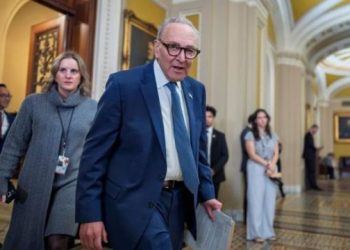Lawyers for former President Donald Trump escalated their efforts to move his New York criminal case to federal court on Monday evening, arguing to an appeals court that he is immune from prosecution for actions taken during his time in office.
Citing the July 1 Supreme Court ruling on presidential immunity, Trump’s legal team told the U.S. Appeals Court for the 2nd Circuit that the charges brought by Manhattan District Attorney Alvin Bragg, a Democrat, stem from official acts performed while Trump was president, which should be protected from prosecution.
“President Trump is subject to an unlawful prior restraint,” Trump attorney Todd Blanche wrote in a 99-page filing, pointing to issues such as “2019 evidence indicating that [the trial judge] previously criticized President Trump’s use of Twitter, which is a central issue in the Presidential immunity motion.”
This request follows a prior attempt in August to move Trump’s criminal hush money case to federal court after a New York jury convicted him in May on 34 felony counts related to falsifying business records. U.S. District Judge Alvin Hellerstein denied Trump’s post-conviction removal request in September, where Trump similarly tied his argument to the Trump v. United States immunity decision.
Trump’s lawyers argue that the use of evidence tied to his official presidential duties during grand jury proceedings and the trial itself violates constitutional protections afforded to the president.
The charges against Trump consist of 34 counts of falsifying business records, connected to hiding a hush money payment to adult film star Stormy Daniels during the final days of his 2016 campaign. Trump has pleaded not guilty. Attorney Todd Blanche, representing Trump, claims that evidence presented at trial, including communications with White House staff, involved official presidential acts, which are immune from prosecution under the Constitution, as reinforced by the recent Supreme Court ruling.
The Supreme Court’s July decision established that while former presidents are protected from prosecution for official actions, there remains uncertainty over what qualifies as “official” versus “unofficial” acts.
Judge Juan Merchan, who oversaw the six-week trial, is expected to rule on November 12 regarding Trump’s motion to vacate the conviction in light of the immunity decision. Sentencing, initially postponed until after the presidential election, is now set for November 26.
This latest appeal comes just weeks before Election Day, as Trump faces tightening polls against Vice President Kamala Harris in key swing states. Trump also confronts two federal indictments that could potentially be dismissed if he wins reelection, as he could instruct the Justice Department to halt the prosecutions led by special counsel Jack Smith.
A ruling from the 2nd Circuit on this request is not expected until after sentencing.
 Telegram is where we really talk. Don't miss out!
Telegram is where we really talk. Don't miss out!







